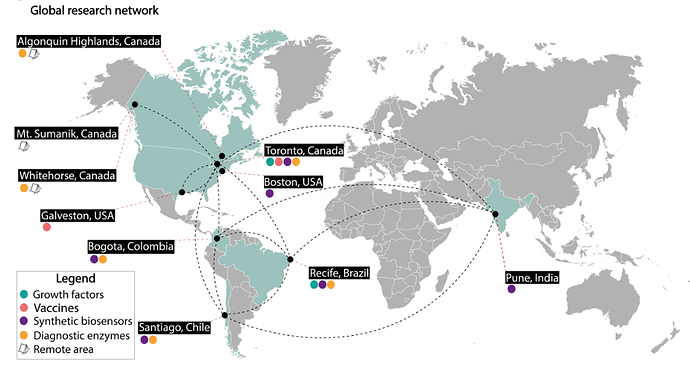Congratulations to @Severine, @abernal @AnibalArc @davidduplat @FernanFederici & many others we know but who aren’t in the Forum (and probably some I didn’t find your username - sorry! Check out the full list of contributors below!)
https://www.medrxiv.org/content/10.1101/2025.07.25.25332228v1
doi: https://doi.org/10.1101/2025.07.25.25332228
This is really important work on cell-free local biomanufacturing and represents a huge amount of work across multiple countries!
International Multi-site Implementation of Local Cell-Free Protein Biomanufacturing to Advance Health and Research Equity
Severino Jefferson Ribeiro da Silva, Quinn Matthews, Séverine Cazaux, Justin R. J. Vigar, Bárbara N. R. Santos, Deyse C. M. Carvalho, Lauren A. Cranmer, David Duplat, Serena Singh, Mohammad Simchi, Paula Benítez-Bolivar, Thaíse Yasmine Cavalcanti, Kaiyue Wu, Renata P. G. Mendes, Tanvi Kale, Ana Luisa Lot Divarzak, Krištof Bozovičar, Jennifer Doucet, Anibal Arce, Cielo Léon, Valentina Ferrando, Jessica Nguyen, Anson Ho, Suelen Cristina de Lima, Pouriya Bayat, Yuxiu Guo, Seray Cicek, Aidan Tinafar, Larissa Krokovsky, Laís Ceschini Machado, Ashyad Rayhan, Idorenyin A. Iwe, Alexander Klenov, Thiago P. G. de Araujo, Jean Phellipe M. do Nascimento, Jurandy J. F. de Magalhães, Marcela Guevara-Suarez, Patricia García Canete, Kodjo Ayi, Moiz Charania, Marcelo H. S. Paiva, Ian Crandall, Tony Mazzulli, Gabriel da Luz Wallau, Abelardo Silva-Júnior, Adriana Bernal, Chaitanya Athale, Alexander A. Green, Scott C. Weaver, Camila González, Fernán Federici, Lindomar Pena, Keith Pardee
Limitations in global access to research and healthcare capacity undermine equity, sustainability, and resilience, particularly in resource-limited settings. Molecular diagnostics and biologic therapeutics are set to revolutionize medicine; however, our dependence on centralized biomanufacturing, and the concomitant cold chain logistics, restrict access to these benefits. While these constraints become particularly evident during global health crises, they reflect a chronic and unmet global challenge. Here, with research teams in North and South America and Asia, we challenge the conventional top-down paradigm by innovating community-driven solutions that empower underserved populations to actively participate in the bioeconomy, producing what they need, when, and where they need it. Our approach leverages decentralized, low-burden biomanufacturing technologies—built on cell-free protein synthesis and open-source hardware—to enable local, on-demand production of critical biologics, including high- value growth factors, vaccines, and diagnostic enzymes, demonstrating performance comparable to commercial gold standards. This platform, implemented at ten sites worldwide, supported patient trials targeting globally relevant pathogens, including SARS-CoV-2, chikungunya, and Oropouche viruses. Together, these initiatives lay the foundation for a new era of globally inclusive biomanufacturing, where innovation goes beyond geographic boundaries, and communities everywhere are empowered to respond to global challenges with enhanced speed, autonomy, and equity.
